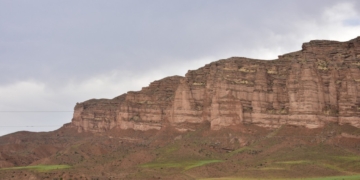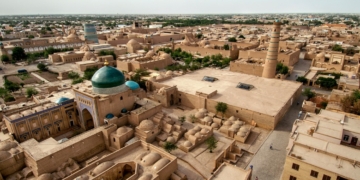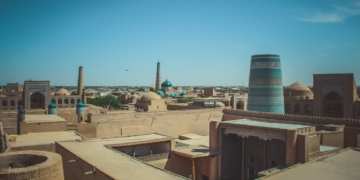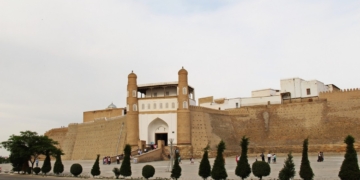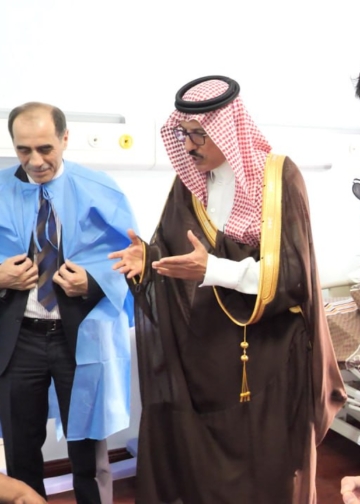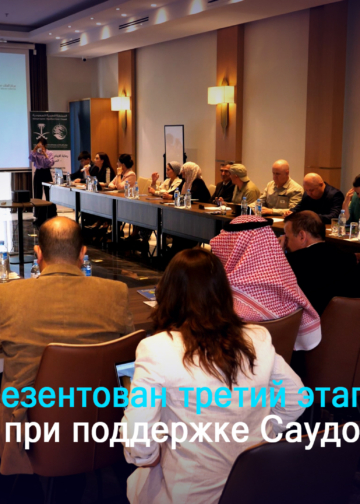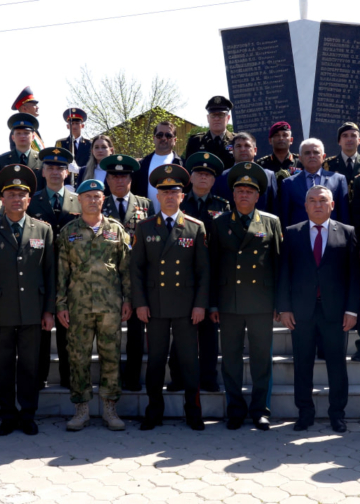id: 149132
date: 4/9/2008 10:24
refid: 08DUSHANBE493
origin: Embassy Dushanbe
classification: UNCLASSIFIED
destination: 08STATE33674
header:
VZCZCXRO7294
RR RUEHLN RUEHVK RUEHYG
DE RUEHDBU #0493 1001024
ZNR UUUUU ZZH
R 091024Z APR 08
FM AMEMBASSY DUSHANBE
TO RUEHC/SECSTATE WASHDC 0376
INFO RUCNCIS/CIS COLLECTIVE
RUEHBUL/AMEMBASSY KABUL 0119
RUEHIL/AMEMBASSY ISLAMABAD 0092
RUEHNE/AMEMBASSY NEW DELHI 0065
RUEHBJ/AMEMBASSY BEIJING 0057
—————— header ends —————-
UNCLAS DUSHANBE 000493
SIPDIS
SIPDIS
DEPT FOR SCA/CEN, ISN/RA RISA MONGIELLO
E.O. 12958: N/A
TAGS: MNUC, KNNP, UNSC, IR, TI
SUBJECT: DEMARCHE DELIVERED ON TRAVEL RESTRICTION REQUIREMENTS IN
UNSCRS 1737, 1747, 1803
REF: STATE 033674
1. (SBU) PolOff and ConOff delivered the demarche on UNSCRs 1737,
1747 and 1803 to Yatimsho Musofirov, the Deputy Head of the Consular
Department of the Tajik Ministry of Foreign Affairs. We gave
Musofirov a non-paper detailing the points raised in reftel, and
described the measures the United States is taking to ensure a de
facto travel ban on all designated officials. Musofirov said he
would forward the information we provided to the appropriate
offices. He was not in a position
to comment specifically on
Tajikistan’s efforts to implement the provisions.
2. (SBU) Musofirov did explain, however, that the State Committee on
National Security is charged with overall implementation of travel
restrictions. In situations such
as this, the Ministry of Foreign
Affairs would alert the State Committee about the travel provisions,
and the State Committee would enter the information into a computer
system that officials use to screen those who enter the country.
The computer system is linked to those used by the other members of
the Commonwealth of Independent States; names and information
entered by other former Soviet countries would automatically be
included in this system.
3. (SBU) Musofirov mentioned that some border posts do not have
access to the computer system (Note: in fact, only the Dushanbe
International Airport is currently connected.) This is not
necessarily a defect in the system, as Iranians need visas to enter
the country, and Tajik consular officers abroad have access to the
necessary information through the Consular Department (with whom
they would need to consult).
4. (SBU) Musofirov also told us about the Ministry’s plans to seek
assistance from the International Organization for Migration, World
Bank, Turkish Embassy, and other potential donors to improve
computer and information systems.
We have nominated Musofirov for
an International Visitor Leadership Program on consular issues
scheduled for June, but he does not yet know whether he will be
allowed to participate.
5. (U) Point of contact on this issue is Greg Naarden,
[email protected].
JACOBSON
=======================CABLE ENDS============================
id: 149137
date: 4/9/2008 10:30
refid: 08DUSHANBE494
origin: Embassy Dushanbe
classification: CONFIDENTIAL
destination:
header:
VZCZCXYZ0000
PP RUEHWEB
DE RUEHDBU #0494/01 1001030
ZNY CCCCC ZZH
P 091030Z APR 08
FM AMEMBASSY DUSHANBE
TO RUEHC/SECSTATE WASHDC PRIORITY 0377
INFO RUCNCIS/CIS COLLECTIVE PRIORITY
RUEHBJ/AMEMBASSY BEIJING PRIORITY 0058
RUEHIL/AMEMBASSY ISLAMABAD PRIORITY 0093
RUEHBUL/AMEMBASSY KABUL PRIORITY 0120
RUEHNE/AMEMBASSY NEW DELHI PRIORITY 0066
RUEAIIA/CIA WASHDC PRIORITY 0074
RUEKJCS/SECDEF WASHDC PRIORITY
—————— header ends —————-
C O N F I D E N T I A L DUSHANBE 000494
SIPDIS
SIPDIS
DEPARTMENT FOR SCA/CEN
E.O. 12958: DECL: 04/09/2018
TAGS: EAID, ECON, EINV, PREL, PHUM, TI
SUBJECT: TAJIKISTAN — A/DAS PAMELA SPRATLEN’S DISCUSSIONS
ON OSCE MANDATE RENEWAL AND NATIONAL DEMOCRATIC INSTITUTE
Classified By: AMBASSADOR TRACEY A. JACOBSON, 1.4 (B) AND (D)
1. (U) Summary: On April 2, Acting Deputy Assistant Secretary
for Central Asia and Public Diplomacy Pamela Spratlen told
senior GOTI officials that the United States supported the
OSCE Chairman in Office’s (CiO) proposal as the basis for
negotiation on renewal of the OSCE mandate in Tajikistan.
Her interlocutors said they would not accept the CiO’s draft,
and wanted to &correct8 the mandate and ensure OSCE funding
served GOTI priorities. The MFA
said the government would
rather see the June 30, 2008 mandate decision deadline pass
rather than yield to the OSCE,s draft.
On the National
Democratic Institute registration, the Ministry of Foreign
Affairs and the Presidential Apparat both gave formulaic
responses promising nothing, but hoping for a mutually
acceptable solution. The
Institute will likely leave
Tajikistan this month. End
Summary.
2. (SBU) A/DAS Spratlen discussed the OSCE mandate and the
National Democratic Institute (NDI) on April 2 with
Presidential Foreign Relations Adviser Erkin Rahmatulloev,
and with Deputy Foreign Minister Erkin Kasimov.
Rahmatulloev on OSCE
———————
3. (C) A/DAS Spratlen began the meeting with Rahmatulloev by
expressing the United States’ gratitude for Tajikistan’s
continuing support for our efforts in Afghanistan, and in
counternarcotics. She emphasized
that the United
States-Tajik relationship was multidimensional, with human
rights, economic development, and security all vital parts of
it. A/DAS Spratlen underlined for
Rahmatulloev that the
United States viewed the OSCE’s Human Dimension activities as
vital, along with a commitment to a market economy in
economic reform activities, and urged that the GOTI work with
the Chairman in Office of the OSCE to conclude a new mandate
which included strong human dimension activities. She in
particular emphasized that the United States supported the
Chairman’s draft mandate as it covered all three dimensions
in a balanced and comprehensive way.
She noted that the
GOTI,s draft omits mention of market economy reforms as well
as explicit mention of democracy and human rights. She said
funding and implementation of planned OSCE border security
projects would depend on the mandate continuing to include
strong human dimension and economic reform components.
4. (C) Rahmatulloev replied that Tajikistan wanted an «open
and transparent» relationship with the United States, and
appreciated United States assistance on economic issues,
education, border security, and other areas. He said
President Rahmon was well-informed about the range of United
States-Tajikistan cooperation.
Taking up the OSCE question,
he said «we want you to understand us correctly» Tajikistan
did not wish to reduce human dimension activities, but did
want to refocus on Tajikistan’s current most pressing
problems, including economic development and «ecological
issues.» He said that
Tajikistan,s situation had changed
since development of the original mandate, but the OSCE had
failed to take account of the state of the country after the
civil war. A/DAS Spratlen,
reinforced by Ambassador,
countered that the Human, Economic, and Security dimensions
Qcountered that the Human, Economic, and Security dimensions
were interlocking. Tajikistan had
suffered through a civil
war, the most serious consequences of which were in the
humanitarian sphere, including in education, health care,
religious tolerance, and balancing the needs of Tajikistan’s
regions. She also noted that
neighboring Afghanistan faced
its greatest challenges in the humanitarian sphere.
Rahmatulloev said he «totally agreed» with A/DAS Spratlen,
and that the GOTI was ready to work with the OSCE on an
acceptable mandate, but then reiterated that the OSCE mandate
must change to reflect the economic needs of Tajikistan.
The Region — Problems with Uzbekistan, and the SCO Can’t Help
——————————————— —————-
5. (C) Rahmatulloev raised the
regional aspects of
Tajikistan’s economic problems and the recent winter economic
crisis, emphasizing that Uzbekistan hindered Tajikistan’s
economic development by blocking trade (including energy) and
preventing development of Tajik hydropower. Rahmatulloev
said that the Shanghai Cooperation Organization could not
help resolve problems between Tajikistan and Uzbekistan
because its principal member states, Russia and China, «had
no enthusiasm» for water and power issues in the region. In
response to A/DAS Spratlen’s question, Rahmatulloev noted the
agenda for the next SCO summit was still under discussion,
but that in May an agenda would begin to take shape. He told
Ambassador he would share details about the summit with the
embassy once they became clearer.
Power Purchasing Agreement — Cart Before Horse
——————————————— —
6. (C) A/DAS Spratlen noted the importance of moving forward
on developing electricity for Afghanistan. Ambassador
reminded Rahmutalloev that Tajikistan needed to conclude a
Power Purchasing Agreement (PPA) with Afghanistan and
Pakistan as soon as possible, to help attract investors and
eventually to help Tajikistan diversify its customer base for
electricity exports. Rahmatulloev
said that a PPA would be
easy to conclude if investment money were already in hand to
build power lines to Pakistan. We
noted that this was
exactly the wrong approach, and that AES had left Tajikistan
in part because of lack of progress on a PPA. Rahmatulloev
argued again that money should come first, and repeated the
oft-heard appeal that the United States invest in a large
hydro power project at Dostijum,
to provide electricity to
the Chinese-owned copper mine in Logar Province, Afghanistan.
Ambassador emphasized that
investment in hydropower was a
commercial decision for U.S. companies, to which Rahmatulloev
insistently replied «it is not a private sector issue. It is
a political issue.»
They Have Every Right to Overthrow Us
————————————-
7. (C) A/DAS Spratlen told Rahmatulloev that in Washington
some analysts worried that Tajikistan risked becoming a
«failed state» as indicated by the Government’s inability to
respond to the winter power and food crisis. She asked what
steps Tajikistan was taking to avoid another crisis next
winter. Rahmatulloev replied that
he recognized that this
was «a dangerous time» for the Government, and said that
President Rahmon, during a recent meeting with senior
officials, had said «we should be grateful to the Tajik
people that they did not overthrow us after this past winter,
as they have every right to do so.»
He also admitted that
the investment climate was poor, and said that a major
problem for Tajikistan was that «we have good laws, but poor
implementation of them.» He
said he was well aware of the
need for Tajikistan to not lose more investors like AES.
Referring to Karl Marx, he commented that «we are still at
the first stage of capitalism, capital accumulation.»
Rahmatulloev worried that a drought predicted for this coming
spring and summer would cause further economic damage.
National Democratic Institute — Noncommittal
———————————————
8. (C) A/DAS Spratlen reaffirmed that support for human
rights was a key part of our policy around the world, and
that in many places, including Tajikistan, the United States
worked with non-government organizations to advance knowledge
of and respect for human rights.
An important partner NGO,
the National Democratic Institute, was about to leave
Qthe National Democratic Institute, was about to leave
Tajikistan because of the Government’s refusal for two years
to register them as a legal entity.
If NDI left, it would do
so «noisily.» This
would send a negative signal to other
NGOs in central Asia, and to American policy leaders. She
noted that the letter from NDI Chairman Madeleine Albright to
President Rahmon urging registration for NDI was a sign of
the significance of this matter, but the letter had gone
unanswered.
9. (C) Rahmatulloev replied that NDI was a «constant issue»
for him. He gave a short
disquisition on the NGO
registration laws, said the matter was with the Ministry of
Justice, noted that he was a bit confused about the true
status of an NGO that was funded by the United States
Government, but said he would work for a «mutually
satisfactory» solution. He
agreed that a noisy departure
should be avoided and agreed look into the issue, but was
vague about how, and made no assurances.
Ambassador noted
that the Ministry of Justice recently told NDI that it would
never obtain registration, and that the Ministry of Justice
would find new problems in every registration application.
Rahmatulloev said in the past NDI had been able to operate
despite the lack of registration; A/DAS Spratlen and
Ambassador emphatically noted this was no longer desirable or
even possible.
Kasimov on OSCE and National Democratic Institute
——————————————— —-
10. (C) A/DAS Spratlen’s conversation with Deputy Foreign
Minister Kasimov illuminated GOTI goals for the OSCE. After
forcefully reiterating the GOTI’s view that the OSCE mandate
was obsolete, and must change its focus to reflect what the
GOTI perceives as Tajikistan’s greatest needs today, Kasimov
emphasized that the GOTI was unhappy with the way programs
were developed in the OSCE and stated openly that activities
of the OSCE Center in Dushanbe should reflect GOTI
priorities. Ambassador noted that
some European states would
rather see the OSCE closed in Tajikistan than have a
watered-down mandate, and that the OSCE mandate needed to
reflect the interests of donors, the OSCE, and the GOTI.
Kasimov assured Spratlen that the GOTI did not plan to
withdraw from its commitments as a democracy, but would not
accept the CiO’s draft mandate, and would go without an OSCE
Center if necessary. He raised
the possibility that some
OSCE permanent institution move its offices to Dushanbe to
reflect the better conditions in central Asia. Kasimov
offered a formulaic response similar to
Rahmatulloev’s when
asked about NDI; «we’ll look into the matter.»
Ambassadors — Keep the Heat On
——————————
11. (C) At a dinner for A/DAS Spratlen hosted by Ambassador,
the Chiefs of Mission of France, Germany, Britain, Turkey,
and the OSCE argued for a unified and hard line on the OSCE
mandate, up to and including closing the OSCE center rather
than accepting Tajikistan’s proposed changes to the mandate.
They predicted that Tajikistan would fold if presented with
the real possibility of closure of the mission, because its
desire to avoid losing foreign assistance was particularly
acute in the wake of the IMF misreporting. The European
Commission Charge d’Affaires said that the EC had approved a
new $28 million assistance package to Tajikistan, but was
withholding any disbursements pending a successful IMF staff
monitoring program at the Central Bank.
The group also noted
that Tajikistan is seeking new sources of financing from Arab
states, pointing to President Rahmon’s recent meetings with
leaders of Algeria and Yemen, and with potential Saudi
investors. Even the Chinese have
expressed concern about
misreporting to the IMF, Ambassador added, showing that
Tajikistan was not finding it easy to find easy money.
Comment: Openness, Some Good, Some Bad
—————————————
12. (C) We were struck by the frankness of the comments by
Rahmatulloev and Kasimov. The
story that President Rahmon
admitted in front of senior officials that the Government
could have faced a serious crisis of public confidence
because of its failure to respond to the winter crisis was
the first report we have had of any self-examination and
criticism at the top, and the first indication that Rahmon is
aware of the damage to his credibility.
However, we have
Qaware of the damage to his credibility.
However, we have
seen no sign that this awareness translates into action —
Rahmon has remained publicly silent about the winter crisis,
and the Government in general shows few signs of being better
organized for next winter.
13. (C) Comment Continued: Kasimov’s comments about the OSCE
mandate were also illuminating, but not encouraging. He
openly said what we have already understood, that the GOTI
wants more control over the OSCE Center’s funding and
activities.
14. (C) Comment Concluded: Regarding NDI, the GOTI offered
weak words and promised no action, and we predict NDI will
leave Tajikistan this month. NDI
submitted another
registration application package to the Ministry of Foreign
Affairs for legalization on April 8, noting that the
documents exactly replicated the successful application
package of another U.S.-funded NGO, the International Center
for Not-for-Profit Law, with only the names changed to make
this NDI’s application. After
legalization, NDI will submit
the package to the Ministry of Justice.
NDI expects MOJ to
reject this package on legalistic grounds, and the
non-committal, formulaic answers given to A/DAS Spratlen by
senior officials suggest NDI is right.
The departure of NDI
would leave the embattled civil society sector weaker, but if
it cannot win legal permission to operate, we would support a
public, but strategically worded departure ) for now. End
Comment.
15. (U) A/DAS Spratlen has cleared this cable.
JACOBSON
=======================CABLE ENDS============================
id: 149299
date: 4/10/2008 9:33
refid: 08DUSHANBE512
origin: Embassy Dushanbe
classification: UNCLASSIFIED
destination:
header:
VZCZCXRO8394
RR RUEHLN RUEHVK RUEHYG
DE RUEHDBU #0512 1010933
ZNR UUUUU ZZH
R 100933Z APR 08
FM AMEMBASSY DUSHANBE
TO RUEHC/SECSTATE WASHDC 0388
INFO RUCNCIS/CIS COLLECTIVE
RUEHBJ/AMEMBASSY BEIJING 0062
RUEHIL/AMEMBASSY ISLAMABAD 0097
RUEHBUL/AMEMBASSY KABUL 0124
RUEHNE/AMEMBASSY NEW DELHI 0070
—————— header ends —————-
UNCLAS DUSHANBE 000512
SIPDIS
SIPDIS
DEPT FOR SCA/CEN
E.O. 12958: N/A
TAGS: PGOV, ECON, PHUM, EINV, TI
SUBJECT: TAJIKISTAN — CONVICTION OF PROMINENT ENTREPRENEUR
REMINDS BUSINESS COMMUNITY OF WHO IS THE BOSS
1. (SBU) On April 8, a court in Tajikistan convicted Marouf
Orifov, the majority owner of the Orima supermarket chain, of
tax evasion and bribery, and sentenced him to 8 years and 6
months imprisonment. The case is
an example of the country’s
oppressive business environment, and the ruthless manner in
which members of President Rahmon’s family exert their
influence over business owners.
2. (U) Members of the State Committee for National Security
arrested Orifov in August 2007, accusing him of attempting to
bribe a State Committee officer.
Unusually for a bribery
case, Orifov spent the initial months of his pretrial
incarceration in a State Committee special facility. The
Anti-Corruption Agency took over the investigation, and
Orifov was ultimately indicted for bribery, tax evasion, and
forgery. The trial began in March
2008, the forgery charges
were dropped, and the court convicted Orifov of the remaining
charges. Although the public
prosecutor requested a sentence
of only four years, the court imposed 8 years and 6 months
imprisonment and confiscation of Orifov’s property (including
his 70 percent share of the Orima chain).
3. (U) Orifov is known as a savvy businessman who gained the
confidence of international financial institutions. He
founded Orima in the mid-1990s, and by early 2007, the chain
had 5 stores in Dushanbe and 1 in Kulyob. Orifov and a Dutch
minority partner secured $500,000 in financing from the
International Finance Corporation in 2005. Based on their
business model and good management record, the European Bank
for Reconstruction and Development provided an additional
$4.6 million in financing in 2006.
The international
community viewed Orifov as one of the few recent success
stories in Tajikistan’s deteriorating business climate.
4. (SBU) Observers have speculated on how Orifov’s fortunes
turned. Many believe that he ran
afoul of President Rahmon’s
daughter, Tahmina Rakhmonova. In
early January 2007, Orifov
opened a store in downtown Dushanbe, in a building owned by
Rakhmonova. The speculation is
that Rakhmonova resorted to
extortion, and when Orifov did not give her as much money as
she wanted, she orchestrated his arrest.
Another version is
that Orifov’s competitors used their connections with
Rakhmonova to bring Orifov down.
Yet another version has
Orifov falling out of favor with security officials due to
his connections in Uzbekistan (Orifov is an ethnic Uzbek).
5. (SBU) Comment: While there is no consensus on the reasons
for Orifov’s fall, the prosecution has all of the hallmarks
of a nepotism-driven prosecution.
Details about Orifov’s
arrest in August 2007 are sketchy, and the severity of the
sentence ) more than double what the prosecutor requested —
is an indication that the government is trying to send a very
forceful message. Orifov is not
from Kulyob, and he was
likely trying to curry favor with the President’s «inner
circle» by doing business with Tahmina Rakhmonova. While
Orifov’s hands are probably not clean (in the current
climate, there is no such thing as an honest businessman in
Tajikistan), this prosecution is an example of how nepotism
trumps business acumen. The fact
that Orifov could not get
himself out of trouble shows that it is more important to be
close to President Ramon and his family members that to run a
successful business. Many believe
that Rakhmonova or her
associates will take over Orima.
Qassociates will take over Orima.
6. (SBU) Comment continued: The prosecution also shows the
government’s surprisingly unpragmatic approach toward
international financial assistance.
Government officials at
all levels argue that Tajikistan needs international
financial aid and assistance.
They were also well aware of
the significant stake that international financial
institutions had taken in Orifov’s business. While
international investment is no reason to avoid prosecuting
criminal wrongdoing, engaging in such a blatantly
nepotism-driven prosecution in this instance does not build
confidence among the international community that Tajikistan
is a worthy beneficiary of assistance.
This case is another
strong signal to investors to stay away from Tajikistan. End
comment.
JACOBSON
=======================CABLE ENDS============================
id: 149705
date: 4/14/2008 6:58
refid: 08DUSHANBE515
origin: Embassy Dushanbe
classification: UNCLASSIFIED//FOR OFFICIAL USE ONLY
destination: 08DUSHANBE512
header:
VZCZCXRO6670
RR RUEHLN RUEHVK RUEHYG
DE RUEHDBU #0515/01 1050658
ZNR UUUUU ZZH
R 140658Z APR 08
FM AMEMBASSY DUSHANBE
TO RUEHC/SECSTATE WASHDC 0391
INFO RUCNCIS/CIS COLLECTIVE
RUEHBUL/AMEMBASSY KABUL 0125
RUEHIL/AMEMBASSY ISLAMABAD 0098
RUEHNE/AMEMBASSY NEW DELHI 0071
RUEHBJ/AMEMBASSY BEIJING 0063
—————— header ends —————-
UNCLAS SECTION 01 OF 02 DUSHANBE 000515
SIPDIS
SENSITIVE
SIPDIS
DEPT FOR SCA/CEN
E.O. 12958: N/A
TAGS: PGOV, PHUM, EINV, ECON, TI
SUBJECT: THE ORIMA DEFENSE TEAM SPEAKS; BUT WHAT ARE THEY
SAYING?
REF: DUSHANBE 512
1. (SBU) Summary: Post reported in reftel on the April 8
conviction of local entrepreneur Marouf Orifov, majority
owner of the ORIMA chain of supermarkets, for bribery and tax
evasion. Orifov’s defense team
corroborated the generally
held view that the trial lacked basic elements of fairness.
While we were unable to clarify exactly how Orifov fell out
of favor with the authorities, we stand by our initial
determination that this verdict is a strong signal that
investors should stay away from Tajikistan. End summary.
2. (SBU) On April 10, Emboffs met with Marouf Orifov’s son,
Alisher, his accountant, Gulnora Makhmudova, and two of his
defense lawyers, Inoyat Agliev and Shavkat Kosimov. We
discussed court proceedings, the financial health of the
company, and the reasons why Orifov was singled out for
prosecution.
Justice, Tajikistan Style
————————-
3. (SBU) The lawyers walked us through the legal issues in
the case. We asked why the
Supreme Court was the court of
first instance. The lawyers said
that they could not find a
legal basis for why a lower court did not try the case, and
Iglaev added «no one here questions the Supreme Court if it
asserts its jurisdiction over a case.» We asked why the
State Committee on National Security began investigating
Orifov in 2007. The lawyers
described how an Orima customer
allegedly complained about the quality of a product she
purchased, which led to a State Committee inspection of one
of Orima’s warehouses.
Eventually, the head of the State
Committee’s Department for Economic Intelligence, Colonel
Salimov, setting up a lunch meeting for August 7, 2007, and
Orifov was arrested for attempted bribery at the restaurant
during the meeting. The lawyers
said the court disregarded
their arguments that the State Committee never had a
statutory basis to begin investigating Orifov in the first
place.
4. (SBU) The lawyers described how the court convicted Orifov
of bribery despite the lack of any evidence directly
implicating him. Colonel Salimov
was the only State
Committee official to testify during the trial, and he did
not present any official reports or documents. The court
viewed a video surveillance tape of the lunch meeting, but
there was no indication that Orifov offered a cash bribe.
The court heard the testimony of two witnesses who were at
the restaurant where the alleged bribe took place; from the
video, they were not in a position to actually witness the
alleged criminal act. There was
no forensic evidence
(including fingerprints) linking Orifov to the $10,000 that
he allegedly handed to Salimov.
5. (SBU) Alisher Orifov walked us through the tax evasion
charge. He recounted the
complicated tax provisions with
which Orima had to comply, and he produced numerous documents
showing that Orima had attempted to clarify its tax
obligations with the Tajik tax authorities from 1997 to 2007.
He said that the court ignored
this evidence, finding his
father guilty of avoiding taxes for 10 years. He pointed out
that the court’s findings on these charges contradicted the
positions that the Ministry of Justice and the Committee on
Taxation had taken.
Big Bucks, Whammies
——————-
6. (SBU) Makhmudova’s description of Orima’s financial
situation is similar to that described in reftel. Orifov
owns 70% of the business, and a Dutch investor owns 30%
(Orifov will have to forfeit his ownership interest pursuant
Q(Orifov will have to forfeit his ownership interest pursuant
to the court verdict). The
company had received a $400,000
loan from the International Finance Corporation in 1999, and
paid it off in full within 5 years.
The company had secured
a $4.6 million loan from the European Bank for Reconstruction
and Development which was to be delivered in four tranches,
and the company has received 2 tranches thus far. The
company has passed all international audits required under
the terms of their loan agreements.
The remainder of their
most recent loan appears to be on hold.
7. (SBU) Makhmudova said that the company used the loans to
build stores and a state of the art warehouse. Orifov’s
DUSHANBE 00000515 002 OF 002
arrest has disrupted the company’s business plan and severely
challenged its ability to stay afloat.
The Real Story Remains Elusive
——————————
8. (SBU) We mentioned different theories about why this case
came about (see reftel). Our
interlocutors called President
Rahmon’s daughter, Takhmina, a «friend,» and they insisted
that Orifov did not have a dispute with her. None of our
interlocutors could come up with a coherent reason for why
the authorities would bend so many rules to prosecute Orifov.
As we were leaving the meeting,
Kosimov told the Political
Assistant, «I think I know who did this, but I have to be
very careful.» He never
revealed his information to us.
9. (SBU) Comment: There is obviously more to this story than
the defense team is telling us.
The defense team has reason
to interpret the facts in this case in Orifov’s favor, but
even taking this into account, we continue to view this case
as a selective, nepotism-based prosecution. On one level,
the case shows the extreme deficiencies in the Tajik criminal
justice system, including the extreme deference the courts
give the State Committee on National Security. On another
level, the case shows the Tajik authorities’ hostility toward
entrepreneurship, and should be used whenever discussing
Tajikistan’s continued requests for financial assistance and
investment. End comment.
JACOBSON
=======================CABLE ENDS============================
id: 149709
date: 4/14/2008 7:52
refid: 08DUSHANBE516
origin: Embassy Dushanbe
classification: UNCLASSIFIED//FOR OFFICIAL USE ONLY
destination:
header:
VZCZCXRO6894
RR RUEHLN RUEHVK RUEHYG
DE RUEHDBU #0516/01 1050752
ZNR UUUUU ZZH
R 140752Z APR 08 ZDK
FM AMEMBASSY DUSHANBE
TO RUEHC/SECSTATE WASHDC 0393
INFO RUCNCIS/CIS COLLECTIVE
RUEHBUL/AMEMBASSY KABUL 0127
RUEHIL/AMEMBASSY ISLAMABAD 0100
RUEHBJ/AMEMBASSY BEIJING 0065
RUEHNE/AMEMBASSY NEW DELHI 0073
—————— header ends —————-
UNCLAS SECTION 01 OF 02 DUSHANBE 000516
SIPDIS
SIPDIS
SENSITIVE
DEPT FOR SCA/CEN
E.O. 12958: N/A
TAGS: PREL, PGOV, ETRD, EINV, ECON, TI
SUBJECT: TAJIKISTAN — BACK IN THE USSR AT TALCO
DUSHANBE 00000516 001.2 OF 002
1. (U) Summary: TALCO, Tajikistan’s state-owned aluminum company,
which accounts for perhaps one third of the country’s gross domestic
product, faces a number of challenges.
During a recent visit to the
plant, EmbOffs observed that the Soviet-style company remains
dependent on electricity at below-market rates, and on cheap labor.
Two thirds of its staff is devoted to non-core activities;
maintenance and repair, and social support services. TALCO risks a
brain drain of engineers and attrition of its labor force to
neighboring countries, particularly Russia. More generally, the
plant serves as the president’s cash cow, and keeping it running for
this purpose undermines the Tajik economy. End Summary.
A Major Source of Income — But At a Cost
—————————————-
2. (U) TALCO is the Tajik government’s largest source of revenues.
It generates 33% of the country’s gross domestic product, 48% of its
export revenues, and 75.3% of its foreign currency reserves. TALCO
produced 421,000 tons of aluminum in 2007, and company
representatives expect production to increase by 6,000 tons in 2008.
TALCO imports raw materials from
India, Azerbaijan, Kazakhstan,
Venezuela, and Russia. TALCO’s
leadership has announced its
intention of mining for raw material inputs in Tajikistan. However,
the capital required for investment makes major mining operations an
unlikely prospect anytime soon.
3. (U) TALCO consumes 8 billion kilowatt hours of electricity per
year — nearly half of Tajikistan’s 2007 electricity production.
Barki Tojik, the country’s electricity monopoly, sells electricity
to TALCO for $.01/kilowatt hour.
Barki Tojik plans to increase the
price to $.025/kilowatt hour by 2010, which TALCO’s operating
management claims could still allow profit once the company
implements planned modernizations.
USAID estimates the «commercial
rate» at which Barki Tojik could maintain and repair its current
operation is $.045/kilowatt hour.
[Comment: USAID-funded studies
suggest that income from Tajik electricity at commercial rates
exported to Afghanistan, or Pakistan would exceed the income from
TALCO.] TALCO has recently made
moves to be more directly involved
in the energy sector. The company
recently purchased a $15 million
heating station project near Dushanbe and a $25 million power
station in Turkmenistan.
[Comment: Such activity by the largest
State-owned company serves as another indication that the government
continues to cling to a Soviet-style, centrally run economy.]
4. (U) The government must devote considerable political resources
to keeping TALCO going. During
the recent winter power crisis, the
government allowed TALCO to operate at near full capacity for
several weeks, while the rest of the country suffered from severe
shortages. President Rahmon
negotiated with Turkmenistan to secure
a supply of power and Uzbekistan provided assistance during the
crises by repairing the high voltage line connecting Turkmenistan
and Uzbekistan to Tajikistan, which had been out of commission since
2001.
Management — Back in the USSR
——————————
5. (U) While TALCO remains Tajikistan’s premier industrial entity,
it continues to face severe management difficulties. Nine major
lawsuits resulting from mismanagement and corruption have cost the
company over $60 million in court fees.
TALCO has not substantially
updated its facilities or equipment since it was founded in 1975 and
Qupdated its facilities or equipment since it was founded in 1975 and
it has not significantly increased production capacity throughout
its 33 year existence. Of 12,600
employees, only 4500 actually work
on aluminum production. The
company devotes an even greater number
of employees (4600) to equipment maintenance and repair. The
remaining 3600 employees provide administrative and social support.
TALCO houses about a third of its workforce in company-owned
apartments, and builds 45 new apartment units every year. It also
runs schools, hospitals, and other services for its staff.
6. (U) Tajikistan’s declining education system and economic
conditions means that the company has difficulty both in finding and
retaining skilled workers. A
deteriorating economic situation has
led to a brain drain. In December
2007, twelve TALCO engineers left
to work for the Pavlodar aluminum smelter in Kazakhstan, lured by
higher salaries, better benefits, and bigger apartments. TALCO’s
Production Department Director Uktam Haidarov expressed his concern
that more of TALCO’s less skilled employees will flee to Russia in
search of higher paying jobs over the coming years. He named this
as the number one problem the company faced. [Comment: we would
argue that it’s number two, behind the non-commercial basis of the
whole enterprise.]
7. (U) The management at the plant is removed from the financial and
DUSHANBE 00000516 002 OF 002
trade aspects of the business.
They merely process production
orders received from TALCO’s central headquarters located an hour’s
drive away in Dushanbe, and receive inputs of raw alumina and
electricity in return. TALCO
relies on a tolling system in which
the company receives a fixed pre-negotiated fee for the processing
of alumina. As a result, the
company is losing out on potentially
hundreds of millions of dollars to offshore tolling companies (see
next paragraph). In April of 2007
the IMF reported that TALCO is
receiving less than a quarter of the international benchmark price
for its aluminum. The World Bank
has publicly criticized the
management for «very limited» international accounting
standards,
inappropriate selection of auditors, and firing auditors after
conflicts over their reports.
TALCO’s management claims that the
company pays a large part of the government budget, but avoids
revealing specific figures.
Follow the Money
—————-
8. (SBU) Although TALCO has been under President Rahmon’s de facto
authority since 1994, TALCO officially came under direct control of
President Rahmon’s family in 2004.
The company is not governed by a
board of directors or any other type of executive committee. The
President’s brother-in-law, Hasan Sadullozoda, does not hold a title
at TALCO, but has close ties with the company’s management and makes
or endorses all major decisions.
A recent Asia Times article
reported that cash from major tolling arrangements flows through an
intermediary company called TALCO Management Ltd (TML), registered
in the British Virgin Islands.
The Tajik government owns 70% of the
TML and the rest is owned by wealthy Tajik individuals, presumably
including members of the Rahmon family.
The difference between
TALCO’s smelter receipts and the declared value of the exported
aluminum, which runs in the hundreds of millions of dollars, may
provide some indication of the amount of money going through TML.
9. (U) The Tajik Government has strongly resisted privatization of
TALCO, arguing that as the sole money maker for Tajikistan’s
industrial sector, TALCO should be under the direct supervision of
the government. In a public
speech in 2006, President Rahmon
formally stated that the Government would not privatize TALCO.
Comment
——-
10. (SBU) Comment: TALCO’s aluminum factory is an impressive sight,
but like many of the country’s assets, President Rahmon sees it as a
means of generating income for himself, his family members, and his
inner circle. Although it is a
state asset, decisions about the
company are not made in the best interests of the country. Partial
or full privatization would provide the basis for investment in the
company, more efficient production, and a stronger financial base
for the country. This, however,
is unlikely, given President
Rahmon’s personal interest in the company.
11. (SBU) Comment Continued: As with other industries, TALCO’s
revenue does not contribute to development of the country; rather
much of it disappears for off-budget activities and projects, such
as palaces and lavish state entertainments. The people of
Tajikistan effectively subsidize TALCO, by living without adequate
health services, education, or electricity. Hundreds of millions or
even billions of dollars have disappeared from the company since
1992, and the huge subsidies TALCO receives in the form of cheap
electricity are draining enormous resources from the Tajik economy.
Qelectricity are draining enormous resources from the Tajik economy.
End Comment.
JACOBSON
=======================CABLE ENDS============================
id: 149711
date: 4/14/2008 7:53
refid: 08DUSHANBE517
origin: Embassy Dushanbe
classification: UNCLASSIFIED//FOR OFFICIAL USE ONLY
destination:
header:
VZCZCXRO6710
RR RUEHLN RUEHVK RUEHYG
DE RUEHDBU #0517/01 1050753
ZNR UUUUU ZZH
R 140753Z APR 08
FM AMEMBASSY DUSHANBE
TO RUEHC/SECSTATE WASHDC 0395
INFO RUCNCIS/CIS COLLECTIVE
RUEHBUL/AMEMBASSY KABUL 0129
RUEHIL/AMEMBASSY ISLAMABAD 0102
RUEHBJ/AMEMBASSY BEIJING 0067
RUEHNE/AMEMBASSY NEW DELHI 0075
RUEATRS/DEPT OF TREASURY WASHINGTON DC
—————— header ends —————-
UNCLAS SECTION 01 OF 03 DUSHANBE 000517
SIPDIS
SIPDIS
SENSITIVE
DEPT FOR SCA/CEN
E.O. 12958: N/A
TAGS: EFIN, ETRD, EINV, ECON, PREL, PGOV, TI
SUBJECT: Tajikistan: Economic Tour de Table
1. (U) Summary: Treasury Attache Tom Lanier’s March 24-31 visit
highlighted several challenges the country’s financial institutions
and large enterprises face.
Meetings with government officials,
international organizations, and business leaders showed the economy
in poor shape, but not a total lost cause. The bad news includes:
incompetent bureaucracy, convoluted fiscal management,
non-transparency, a failing agricultural sector, remnants of a
closed and centrally-run economy, a debilitating debt burden, loss
of international credibility, and stalled economic reforms. More
positively, there were glimmers of hope in the small and medium
scale private sector, the new leadership of the National Bank, and
potential investment opportunities in mining and hydropower. End
Summary.
Ministry of Finance — Contrition
———————————
2. (U) Minister of Finance Safarali Najmuddinov admitted that the
government had made «many, many» mistakes and blamed
inexperience
for slowing Tajikistan’s transition to a free economy. Najmuddinov
promised more transparency following the revelations about the
cotton debt problem and hoped this would attract more investments
and loans, though he did not appear to fully understand the types of
debt the government was taking on.
It was also not clear whether
the loan guarantee terms that the National Bank had contracted with
foreign banks had been shared with the Ministry of Finance.
Najmuddinov explained that the budget deficit, forecasted to be 2.4%
of GDP, would be covered via privatizations, the issuance of
Treasury bills, and excess cash reserves held at the National Bank.
National Bank of Tajikistan — Independence Days
——————————————
3. (U) New Chairman Sharif Rahimzoda assured us that the National
Bank would be more independent under his leadership. Rahimzoda, who
has been on the job for two months, did not impress us with
extensive knowledge of general central bank issues, but he did
acknowledge the need for better reporting, transparency, monetary
policy, and asset and liability management. Rahimzoda seemed eager
to rebuild the Bank’s lost credibility after the IMF misreporting
scandal under previous Chairman Murodali Alimardon (now the Deputy
Prime Minister responsible for the cotton sector). Lanier
recommended that the Tajik National Bank follow the footsteps of
other central banks and seek legal representation from an
international firm. Lanier
expressed concern that the National
Bank’s net level of reserves was too low at only $70-80 million
(total reserves are $320 million).
Presidential Advisor Davlatov
——————————
4. (U) Matlubkhon Davlatov, the State Economic Advisor (and rumored
Uncle) to President Rahmon, expressed gratitude for U.S.-funded
assistance programs, and for the bridge at Nizhny Pyanj connecting
Tajikistan and Afghanistan. He
said he was focused on avoiding
another power and food crisis next winter (without giving
specifics), asked for another bridge, and for a break on the
repeated visa applications he has to make for each trip to the
United States. (Note: Based on
reciprocity, Tajik diplomats receive
single entry visas; the Embassy has encouraged the Tajik Foreign
Ministry to issue multiple entry visas instead.)
TALCO — New Line of Business
—————————-
5. (U) TALCO, the behemoth state-owned aluminum company, has entered
Q5. (U) TALCO, the behemoth state-owned aluminum company, has entered
the energy sector, according to Commercial and Financial Director
Sherali Kabirov. TALCO recently
purchased a $15 million heating
station project near Dushanbe and a $25 million power station in
Turkmenistan. Kabirov said TALCO
hoped to reduce the $350-400
million in yearly transport costs of raw material inputs for its
aluminum plant, by developing mining in Tajikistan. Kabirov was
adamantly opposed to privatization of TALCO, citing the need for
strong management. He said
TALCO’s leadership reports directly to
the President. When asked why
TALCO was entering the power
industry, he said it was at the President’s order. Kabirov
emphasized that TALCO paid a large part of the government budget,
but pointedly declined to provide specific figures. Nor did he
acknowledge that state-owned Barki Tojik provides subsidized
electricity to TALCO.
World Bank — Upside Down
————————
DUSHANBE 00000517 002 OF 003
6. (SBU) Lanier met with Chiara Bronchi, recently arrived Country
Manager for the World Bank. Ms.
Bronchi expressed guarded optimism
about the economic situation. She
said that while the economy was
«upside down,» now was the time to push for reform. Ms. Bronchi
criticized the command-and-control cotton sector supported by
«messy» financing, but noted that at least the quality of the
cotton
was good. She commented on the
potential of the energy sector, but
worried that the urgent need to maintain existing systems
overshadowed new projects. She
questioned the likelihood of
obtaining an estimated $400-500 million required for the
rehabilitation of the Nurek dam.
The dam is sinking, and the
turbines need to be restored.
IMF — the Dog Chases its Tail
——————————
7. (SBU) The IMF Resident Representative, Lucas Moers, warned that
expectations of the IMF-sponsored audit of the National Bank (not
likely to take place before the end of the year) may be too high
since it would be based largely on information provided by the Tajik
Government itself, which would likely be limited. Moers said
National Bank reforms should include increased independence from the
Ministry of Finance, a board with representatives that are not
affiliated with the political establishment, and rules that
explicitly define conflicts of interest.
On a macroeconomic level,
Mr. Moers said that Tajikistan must prioritize agricultural sector
reform. Ideally the government
should go after the
politically-connected cotton investors, but he joked that that would
be like a «dog chasing its tail.»
KazCommerce Bank
—————-
8. (U) KazCommerce’s Board Chairman, Rashid Saidov, told Lanier that
aside from the difficulty of obtaining a license from the National
Bank (received on January 24, 2008), the company had not encountered
significant government interference.
KazCommerce Bank, the first
major foreign commercial bank to operate in Tajikistan, will
initially target trade finance and corporate clients and later small
and medium enterprises. Saidov
claimed that KazComemmerce Bank
would not conduct business with politicians who have their own
companies or extend credit to state-owned companies, but then later
in an apparent contradiction admitted that KazCommerce had loaned
$12 million to TALCO [Note: KazCommerce was also the largest
provider of government-guaranteed loans to cotton investors in the
recent Central Bank/IMF misreporting scandal]. Saidov said that
high interest rates in Tajikistan were favorable for KazCommerce,
but noted problems such as the lack of investment capital, the
absence of a securities market, and poor currency exchange
facilities.
Somon Capital
————-
9. (U) The Executive Director of Somon Capital, Michael Pedersen (of
Denmark), told us that Tajikistan had excellent investment
potential, but noted several major obstacles to investors. He said
the largest impediment to business development was corruption and
vested interests. In order to
attract foreign investment the
government must sign the New York Convention (on the Recognition and
Enforcement of Foreign Arbitral Awards) and pursue a sovereign
rating. Nine Tajik government
ministers met with representatives
from Moodys and Standard & Poor on February 7. Unfortunately since
the IMF misreporting scandal, progress on a sovereign rating has
Qthe IMF misreporting scandal, progress on a sovereign rating has
stalled.
Comment
——-
10. (SBU) Lanier arrived after the winter weather had abated, but he
was still witness to a troubled economic situation. He was
encouraged, however, to find that the new Central Bank chairman
seemed more independent-thinking than his predecessor. The news
from TALCO that it is entering the energy sector is another sign
that the President clings to Soviet-style central planning. As the
World Bank and IMF said, if the economy is to avoid serious decline
the government must turn around its failed agricultural
(particularly cotton) policy, reduce government interference in the
private sector, improve fiscal transparency, implement land reform
laws, and establish free economic zones.
Basic steps like signing
the New York Convention and seeking a sovereign rating would
increase Tajikistan’s credibility for potential investors; but
taking these steps will upset vested interests. End Comment.
DUSHANBE 00000517 003 OF 003
JACOBSON
=======================CABLE ENDS============================
id: 149792
date: 4/14/2008 14:52
refid: 08TASHKENT432
origin: Embassy Tashkent
classification: CONFIDENTIAL
destination: 07DUSHANBE1531|08TASHKENT299|08TASHKENT362
header:
VZCZCXYZ0002
PP RUEHWEB
DE RUEHNT #0432/01 1051452
ZNY CCCCC ZZH
P 141452Z APR 08
FM AMEMBASSY TASHKENT
TO RUEHC/SECSTATE WASHDC PRIORITY 9492
INFO RUEHZG/NATO EU COLLECTIVE
RUEHAH/AMEMBASSY ASHGABAT 3871
RUEHTA/AMEMBASSY ASTANA 0084
RUEHEK/AMEMBASSY BISHKEK 4486
RUEHLM/AMEMBASSY COLOMBO 0353
RUEHKA/AMEMBASSY DHAKA 0308
RUEHDBU/AMEMBASSY DUSHANBE 0364
RUEHIL/AMEMBASSY ISLAMABAD 4080
RUEHBUL/AMEMBASSY KABUL 2354
RUEHKT/AMEMBASSY KATHMANDU 0392
RUEHNE/AMEMBASSY NEW DELHI 1025
RUEHUM/AMEMBASSY ULAANBAATAR 0058
RUEHMO/AMEMBASSY MOSCOW 7356
RUEHGV/USMISSION GENEVA 1094
RUCNDT/USMISSION USUN NEW YORK 0200
RUEAIIA/CIA WASHDC
RHEHNSC/NSC WASHINGTON DC
RHEFDIA/DIA WASHDC
RUEWMFC/SECDEF WASHINGTON DC
—————— header ends —————-
C O N F I D E N T I A L TASHKENT 000432
SIPDIS
SIPDIS
DEPT FOR SCA/CEN AND DRL
E.O. 12958: DECL: 04/14/2018
TAGS: PHUM, KIRF, PGOV, PREL, TI, UZ
SUBJECT: UZBEKISTAN: RELIGIOUS AFFAIRS COMMITTEE AND MFA
WARN THAT JEHOVAH’S WITNESSES RISK DEREGISTRATION FOR
ACTING OUTSIDE THE LAW
REF: A. TASHKENT 362
B. TASHKENT 299
C. 07 DUSHANBE 1531
Classified By: Poloff R. Fitzmaurice for reasons 1.4 (b, d).
1. (C) Summary: During a five-day
visit to Uzbekistan on
March 27 — April 1 (septels), Acting Deputy Assistant
Secretary for South and Central Asian Affairs Pamela Spratlen
SIPDIS
visited the Tashkent main Madrassah and the Jewish community
in Bukhara. She also met with
Ministry of Foreign Affairs
representatives and the Acting Religious Affairs Committee
Chairman Artibek Yusupov. She
raised concerns over the
recent harassment of Jehovah’s Witnesses, including the case
of a congregant in Samarkand who was charged with a criminal
offense and faces five years’ imprisonment (ref A). Both the
Acting Chairman and the MFA’s America’s Desk Chief expressed
pride in Uzbekistan’s history of religious tolerance, but
also warned that if the Jehovah’s Witnesses continued to
violate Uzbek law by proselytizing and other «illegal» acts,
they risked deregistration of their last legal congregation,
in Chirchiq, a move that would effectively ban the Jehovah’s
Witnesses in Uzbekistan. It is
difficult to assess whether
the threat was serious or mere bombast.
The government also
continues to deny that it is clamping down on devout Muslims.
End summary.
A/DAS SPRATLEN RAISES RECENT HARRASSMENT OF JEHOVAH’S
WITNESSES IN SAMARKAND
——————————————— ———
2. (C) A/DAS Spratlen, along with
the Ambassador and DCM,
met with Acting Religious Affairs Committee Chairman Artibek
Yusupov on March 31. A/DAS
Spratlen praised cooperation with
the government for cooperating with the U.S. government since
it was named a Country of Particular Concern under the
International Religious Freedom Statute and noted some
encouraging signs, including the reported absence of
anti-Semitism in Bukhara’s Jewish community and the fact that
Jehovah’s Witnesses were able to observe the memorial of
Jesus’ death on March 22 largely without interference for the
second year in a row. However,
Spratlen raised two specific
concerns. First, she noted the
recent harassment of
Jehovah’s Witnesses in Samarkand, raising in particular the
case of Olim Turayev, who was recently charged under Criminal
Code 216 («Illegal Establishment of a Religious
Organization») and faces up to five years’ imprisonment (ref
A). More generally, she added
that Uzbek courts continue to
sentence Muslims for religious extremism without due process
of law, most recently demonstrated by a case in Bukhara in
which 13 individuals received long prison sentences based on
scant evidence and coerced testimony (ref B).
ACTING CHAIRMAN ADMITS PROBLEMS WITH JEHOVAH’S WITNESSES,
DENIES THAT THEY ARE SINGLED OUT
——————————————— ————
3. (C) In response, Yusupov noted
that of the 16 registered
religious confessions in Uzbekistan, the Committee has had
the most problems by far with the Jehovah’s Witnesses.
Yusupov asserted that the government treated Jehovah’s
Witnesses no differently than any other registered religious
confession in Uzbekistan. He
observed that the government
enjoys good relations with other religious minorities, noting
that an Orthodox congregation received permission to build a
new church in Khorezm province two months ago.
4. Turning to specifics, he
argued that the Jehovah’s
Witnesses frequently engaged in proselytizing, which is


























